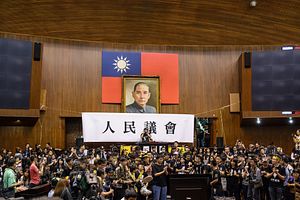In a recent interview with the New York Times, Taiwanese leader Ma Ying-jeou stressed his support for the ongoing protests in Hong Kong. In doing so, Ma emphasized the differences between the Occupy Movement in Hong Kong and the occupation of Taiwan’s legislature by the Sunflower Movement in March. Ma stressed that “the goals of the two movements are different. In Hong Kong, the aim is universal suffrage, in other words, demanding democracy.” By contrast, Ma said, “In Taiwan, the movement opposed our mainland China policy, objecting to a public policy.”
That’s true, up to a point. But there is an implied message in Ma’s comments that the ends justify the means. In other words, as long as people can claim to be making reasonable and righteous demands, they may adopt and persist in any kind of approach, even if their actions violate the rule of law, contradict the will of the majority, and threaten social order and security. Hence, following this logic, Taiwan’s student protests were unacceptable because they sought to overturn the Taiwanese authorities’ mainland policy, or more specifically the Cross-Strait Services Trade Agreement. On the other hand, Hong Kong students are seeking direct elections and democracy, demands that Ma sees as reasonable. Thus their tactic of occupying central areas in Hong Kong is somehow acceptable and deserving of support. Following this logic, the end goal always trumps the means, whether the protests consist of a peaceful demonstration or occupying public facilities in the name of “civil disobedience.”
In fact, quite a number of people participating in the Occupy Central movement use this idea of “civil disobedience” to justify their activities. However, as the Hong Kong Bar Association pointed out in a statement, “civil disobedience is a philosophical, not a legal principle.” In other words, one’s “motive for committing [an] offense, however noble or honorable, is not a legal justification or defense to [a] criminal charge.” The HKBA emphasizes that “it is essential for participants to respect the rights and freedoms of other people who do not necessarily agree with their views and not to cause excessive damage or inconvenience.”
Additionally, Ma’s way of conceptualizing the protests leaves him open to charges of a “double standard.” According to some reports from both Taiwanese and international media, participants in Taiwan’s Sunflower Movement were “fighting for the very democracy of this island,” as one op-ed in The Guardian put it. Likewise, most Western media see the quest for direct elections in Hong Kong as a kind of spontaneous democratic movement. In legitimizing one claim and denouncing the other, Ma seems to adopt a double standard. He wants to uproot Taiwan’s “sunflowers” while holding high Hong Kong’s “umbrella.”
This problem relates to my argument in a previous essay. Democracy is a good thing, but we need to seriously consider what kind of democracy Hong Kong needs and, to go even further, what kind of democracy China needs. More importantly, how can this democracy be realized peacefully and lawfully? These are the very issues that cannot and should not be decided only by the minority of people now occupying Hong Kong’s public facilities, much less by commenters in the Western world.
Update:
Gary Sheu, Director of the Press & Information Dept. of the Taipei Economic and Cultural Representative Office in Japan, has responded to this article:
The Republic of China (ROC) on Taiwan has developed and become a full-fledged democracy over the decades. Taiwan and Japan are the only entrants from Asia listed as “Free,” in the Press Freedom Rankings published by US-based Freedom House. A democratic government tolerates differences of opinion, fosters dialogue, resolves disputes, and engenders social stability. The ROC stands as an eloquent testimony to the truth of this statement.
In the case of the Sunflower Movement in Taiwan, President Ma Ying-jeou applauded students’ passion and motives; however, the act of occupying government offices is not acceptable. After all, the rule of law is the basis of democracy; without the rule of law, there would be no democracy. Based on this principle, Taiwan government had responded to students’ demands positively and peacefully.
With regard to the pro-democracy demonstration in Hong Kong, President Ma has said that the ROC has had universal suffrage for quite some time, so it fully understands and supports the Hong Kong people’s demand for universal suffrage. He urged the authorities in mainland China to heed the voices of the Hong Kong people and to adopt a peaceful and cautious attitude in handling the situation. At the same time, he hoped that the people of Hong Kong will use peaceful and rational means to express their demands.
In an interview with the New York Times on October 31, President Ma reiterated clearly, “I support democracy, but oppose violence. No democratic country can allow its legislature or executive government agencies to be occupied by anyone, including students. That’s violence, not democracy.” He also stressed that if mainland China can practice democracy in Hong Kong or if mainland China itself can become more democratic, then this would be a great step toward creating closer cross-straits ties in the long run. What President Ma supports is the hard-won democracy and the rule of law.
































